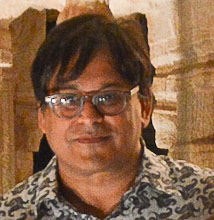Declaration requirements
The ISF Declaration Requirements have been updated, effective Fall 2025. Please read carefully.
The ISF declaration requirements consist of two classes, each taken from two of the following three categories of courses: Disciplines, Comparative Horizons, or Cross-Disciplines. AP credit cannot be used to satisfy prerequisite requirements for ISF.
Students may apply to the major at any point during the semester (prior to the final day of classes) once they have:
1) Completed their first declaration requirement course with no less than a C grade and are currently enrolled in their second declaration course.
2) Had their research program approved by an ISF faculty advisor.
Final acceptance in the program will be contingent on receiving a grade of C or better in the second course and attainment of a 2.0 or higher GPA in all courses that apply to the major requirements, which include the declaration requirements, ISF Core requirements, and faculty-approved Course of Study classes.
For transfer students, it is strongly recommended that these declaration course requirements be completed before enrolling at Berkeley. Transfer students must submit unofficial transcripts of courses already taken as part of their ISF major application. Both applicable transfer courses must be taken for a letter grade.
Disciplines
An introductory course in any discipline offered through the Division of Arts and Humanities, the Division of Social Sciences, and the professional schools. Examples of acceptable Disciplines courses that meet this requirements are below. Note this is no longer an exhaustive list of acceptable courses.
- Political Science 2 (Comparative Politics), 4 (Political Theory), 5 (International Relations)
- Philosophy 2 (Ethics and Social Justice), 3 (The Nature of Mind)
- Sociology 1 (Introduction to Sociology)
- Anthropology 3 (Introduction to Social/Cultural Anthropology)
- Economics 1 or 2 (Introduction to Economics)
- Geography 10 (World Regions, Peoples, States)
- Psychology 1 (General Psychology)
- Rhetoric 10 (Introduction to Reason and Argument)
- Education 190 (Critical Studies in Education)
- Public Policy 101 (Introduction to Public Policy Analysis)
Comparative Horizons
(Previously World Regions) A course focusing on a world region outside of the U.S. or on a historical period prior to the 21st century. Examples of acceptable Comparative Horizons courses that meet this requirement are below. Note this is no longer an exhaustive list of acceptable courses.
- Art History 11 or C11 (Introduction to Western Art)
- Chinese 7A/B (Premodern, Modern Chinese literature)
- AGRS 10A or 10B (Ancient Greek and Roman Studies)
- African-American Studies 4A or 4B (Pre-colonial/20th century Africa)
- History 2 (Comparative History), 4A or 4B (Medieval Europe), 5 (Europe Since the Renaissance), 6A or 6B (China), 8A or 8B (Latin America), 10 (Africa), 11 (India), 12 (The Middle East), 14 (Japan),
- Global Studies 45 (Survey of World History)
- ISF 10 (Enduring Books of the Western Tradition)
- Japanese Studies 7A or 7B (Premodern, Modern Japanese Literature)
- Southeast Asian Studies 10A or 10B (Premodern/modern Southeast Asia)
Cross-Disciplines
Cross-Disciplines is designed to provide students with the skills and tools for innovative, interdisciplinary research and to expose students to current interdisciplinary topics that are mostly, but not exclusively, humanistic in orientation.
- ISF 110: Fundamental Texts
- ISF 120: Enduring Questions, Contemporary Challenges (pending)
- ISF 130: Methods and Theories: Humanistic Inquiry
- ISF 140: Science and the Human(ities) (pending)
ISF faculty advisors will have the discretion, in unusual cases, of accepting applications to the ISF program from students who have completed upper division courses that have adequately prepared them for their designated research program and that fulfill the spirit of the declaration requirements of disciplinary or regional preparation for the major.
Upper Division
All courses used to fulfill ISF major requirements must be taken for a letter grade. No exceptions. Only COVID exceptions and Fall 2022 P/NP grades will be considered. Courses offered on a mandatory P/NP basis cannot be used to fulfill an ISF major requirement.
ISF Core Requirements (4 courses)
Theory and Methods
ISF 100A: Introduction to Social Theory and Cultural Analysis (4 units)
All ISF majors must take ISF 100A. No exceptions.
Theory and Practice
All ISF majors must take a Theory and Practice course from the ISF 100-series courses listed below.
- ISF 100B: Interdisciplinary Theories of the Self and Identity (4 units)
- ISF 100C: Language and Identity (4 units)
- ISF 100D: Introduction to Technology, Society, and Culture (4 units)
- ISF 100E: The Globalization of Rights, Values, and Laws in the 21st Century (4 units)
- ISF 100F: Theorizing Modern Capitalism: Controversies and Interpretations (4 units)
- ISF 100G: Introduction to Science, Society, and Ethics (4 units)
- ISF C100G: Introduction to Science, Technology, and Society (4 units)
- ISF 100H: Introduction to Media and International Relations (4 units)
- ISF 100I: Consumer Society and Culture (4 units)
- ISF 100J: The Social Life of Computing (4 units)
- ISF 100K: Health, Wealth, Love, and Happiness (formerly “Health and Development”) (4 units)
These core courses provide an introduction to interdisciplinary theories and methodologies in the social sciences and the humanities. A student may not double-count a course as part of their course of study and as meeting the Theory and Practice requirement.
NOTE: If a student’s course of study requires advanced work in a specific methodological approach, an appropriate course may be substituted for ISF 60, 100B, 100C, 100D, 100E, 100F, 100G, 100H, 100I, 100J or 100K with the permission of their faculty adviser. In such cases, the student’s area of concentration normally requires courses in quantitative analysis, advanced statistical methods, demographics, natural sciences, and/or computer science.
Interdisciplinary Research Methods
ISF 189: Interdisciplinary Research Methods (4 units)
For all applicants, ISF 189 must be completed before ISF 190, the Senior Thesis Seminar, and in the semester before they graduate. ISF 190 must then be completed in their final semester. If a student enrolls in ISF 190 either simultaneous with or without having passed ISF 189, the student will be dropped from ISF 190.
This class is an introduction to research methods, leading students through different units built around specific learning goals and practical exercises. The course is designed to teach a range of research skills, including (but not limited to) the ability to formulate research questions and to engage in scholarly conversations and arguments; the identification, evaluation, mobilization, and interpretation of sources; methods and instruments of field research (interviews, questionnaires, and sampling) and statistical thinking; and the construction of viable arguments and explanation in the human sciences. At the same time, the course is designed to help students identify their own thesis topic, bibliography, and methodological orientation in preparation for ISF 190.
Note: The following courses will be accepted in place of ISF 189, with faculty approval, through Fall 2023 only. Effective Spring 2024, ISF 189 is required for all ISF majors, no exceptions. If a student requires additional methods practice for their Senior Thesis, additional methods courses may be used towards the Course of Study only.
- Anthropology 169B – Research Theory and Methods in Social and Cultural Anthropology
- Demography 160 – Special Topics in Demography
- History 104 – The Craft of History
- Psychology 101 – Research and Data Analysis in Psychology
Senior Thesis
ISF 190: Senior Thesis (4 units)
Must be completed in a student’s final semester, after they have completed ISF 189.
Course of Study (6 courses)
A minimum of 20 UNITS (at least SIX courses) drawn from at least THREE fields or disciplines. Courses for this requirement must be UPPER DIVISION, (numbered 100 or above). A student may use a maximum of 3 classes from one discipline. All courses a student self-selects for their Course of Study must be approved by their faculty advisor.
The ISF courses listed above under the “Cross-Disciplines” (ISF 110 and 130) may be used towards this requirement. However, the same course must not be double-counted to satisfy both the major declaration requirement and the course of study requirement.
The initial approval of classes chosen for a student’s Course of Study is made by the ISF faculty advisor when they review the student’s application. If a student wishes to make changes to their Course of Study after they are declared an ISF major, they can submit a Course of Study Update Form. More information about this can be found in the FAQ section of the ISF website, under the “What do I do if I want to take a class for my Course of Study that I didn’t list on my application?” question.
Honors Program
All ISF students seeking honors enroll in the senior thesis seminar , ISF 190.
Students eligible for honors must still have a cumulative and major GPA of at least 3.6.
Students will first need to identify and seek out Senate faculty members from other departments for advice and to serve as second readers. Students must then let their ISF 190 instructor know that they intend to pursue honors in the major. This notification should take place early in the semester in which the student is enrolled in ISF 190.
Student grades in ISF 190 will be constituted by an average of grades assigned by the ISF 190 Instructor and the second readers. Students in the honors option will be nominated for a degree of honors (Honors, High Honors, Highest Honors) by the ISF instructor, the second reader, or another ladder faculty member.
Senior honors theses that receive honors will be no different in length and baseline requirements than other ISF senior theses, although they will inevitably use more primary and secondary sources, employ a more sophisticated methodology, and offer more rigorous and sophisticated interpretations.
Upon completion of all requirements, students will receive their diploma with a special label affixed indicating the awarding of honors.





